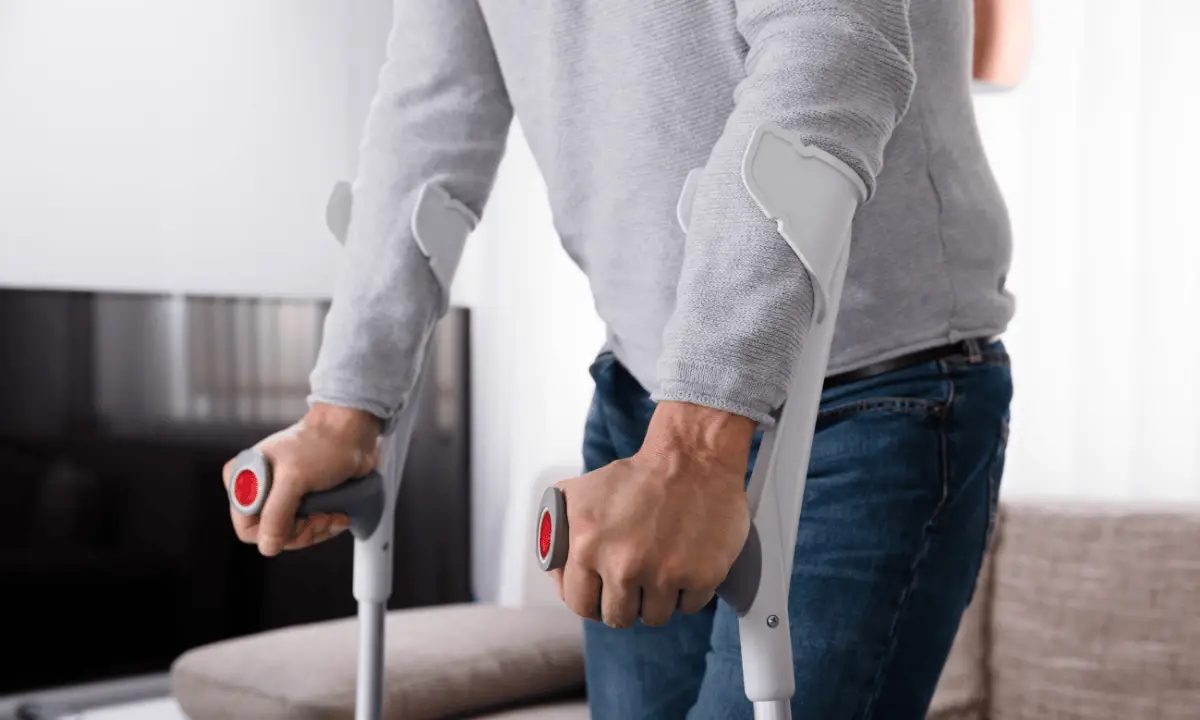Losing your mobility after an accident can change your life in ways you never imagined. The simplest tasks become complicated. Everyday routines become challenges. And behind every physical limitation is the emotional weight of uncertainty: How will I keep working? Who will cover the medical bills? What support is even available to me?
At Withstand Lawyers, we understand that mobility loss injuries don’t just affect your body; they affect your future. If you’re navigating the results of a workplace accident, you may be entitled to mobility loss compensation through Australia’s workers compensation system. Whether it’s a serious fall, a spinal injury, or a condition that’s worsened over time, it’s critical to understand your legal entitlements to compensation and the support systems designed to help you reclaim your independence.
This guide will walk you through everything you need to know about making a mobility loss claim, including eligibility, compensation entitlements, and how Withstand Lawyers can help you every step of the way.

What Is Mobility Loss Compensation
Mobility loss compensation refers to financial support awarded to individuals who experience reduced movement or physical function as a result of an accident or injury, particularly in the workplace. In Australia, this type of compensation commonly falls under workers compensation schemes, which are designed to cover medical treatment, lost income, rehabilitation, and, in some cases, lump sum payments for permanent impairment.
Whether you are unable to walk without assistance, have lost strength or movement in your limbs, or are facing long-term restrictions after a serious accident, mobility loss compensation aims to help you regain independence and protect your financial future. It’s not just about recognising the physical injury — it’s about acknowledging how your life has changed and ensuring you’re supported moving forward.
Types of Mobility Loss Injuries Recognised in Workers Compensation Claims
Mobility loss can happen suddenly, such as after a fall or traumatic injury, or develop over time due to repetitive strain or worsening musculoskeletal conditions. In workers compensation claims, common mobility-related injuries may include:
Damage to the spine, such as herniated discs, vertebral fractures, or spinal cord trauma, can lead to reduced mobility, nerve damage, or even paralysis. These serious conditions often result from heavy lifting, falls, or machinery accidents at work.
👉 Learn more about spinal injury compensation claims.
Losing a limb or sustaining a severe crush injury at work can cause permanent mobility loss and require ongoing support, including prosthetics and home modifications. These injuries often occur in high-risk industries like construction, warehousing, or manufacturing.
👉 See how we help workers claim compensation for crush injuries.
Injuries to the lower back, including soft tissue damage or lumbar disc issues, are some of the most common work-related injuries and can severely restrict bending, lifting, and overall movement. Many back injuries develop from repetitive strain or sudden trauma at work.
👉 Read our guide to bulging disc back injury compensation claims.
Work-related nerve injuries (such as sciatica, carpal tunnel syndrome, or peripheral neuropathy) can lead to chronic pain, muscle weakness, and mobility restrictions. These injuries are often caused by repetitive movements, falls, or crush incidents.
👉 Find out how to claim compensation for nerve damage.
Torn ligaments, dislocations, or joint degeneration in the knees or hips can seriously impair walking and balance. These injuries may result from falls, lifting heavy objects, or prolonged kneeling on the job.
👉 Learn more about knee injury compensation claims.
Injuries to the joints, including rotator cuff tears, bursitis, and labral damage, can limit strength and range of motion, impacting your ability to lift, move, or walk safely. These are common in manual labour roles and physically demanding jobs.
👉 Visit our page on shoulder and joint injury claims.
These types of injuries can result in partial or total loss of mobility, often requiring extensive recovery support, rehabilitation services, and in more severe cases, ongoing care or assistive devices such as wheelchairs or walking aids.
If you’ve suffered mobility loss due to a work-related injury, you may be entitled to workers compensation. Contact our experienced workers compensation lawyers today for a free claim assessment and find out what compensation you’re eligible to claim.
How Mobility Loss Can Impact Your Ability to Work
Mobility loss isn’t just an injury, it can change the course of your career. Many injured workers find themselves unable to perform physical tasks they once did with ease. This may include:
🔹 Inability to stand or walk for extended periods
🔹 Reduced strength or stability when lifting or carrying
🔹 Difficulty navigating stairs, ladders or uneven surfaces
🔹 Restricted ability to operate machinery or vehicles
🔹 Reduced coordination or reaction time due to pain or nerve damage
For some workers, even returning to light duties may not be possible. This can result in extended time off work, loss of income, or the need to shift careers entirely. Mobility loss compensation is designed to provide support during this transition, covering wage loss, rehabilitation costs and possible lump sum payments if your condition leads to a permanent impairment rating.

Can You Claim Compensation for Mobility Loss After a Workplace Injury?
Yes, if you’ve suffered mobility loss as a result of a workplace accident, you may be entitled to claim compensation through the NSW Workers Compensation Scheme.
Whether the loss is temporary or permanent, physical or neurological, the key factor is proving that the injury is work-related and has had a measurable impact on your ability to function and earn a living.
Eligibility Requirements for Loss of Mobility Workers Compensation in Australia
To make a mobility loss claim under NSW workers compensation, you’ll need to meet the following criteria:





Whilst the NSW workers compensation scheme is designed to support injured workers, the process can be complex. This is especially true for serious injuries such as those involving mobility loss, where long-term care, income support, and lump sum entitlements may be involved. Acting quickly and seeking legal support early can make all the difference.
Our team of experienced workers compensation lawyers can help you navigate the claims process, gather the right medical evidence, and ensure your rights are protected every step of the way so you receive the full compensation you’re entitled to.
Contact us today for a free claim assessment to make sure you are receiving the maximum compensation available to you after a workplace accident that results in mobility loss.

Can You Claim Compensation for Mobility Loss That Develops by Aggravating an Existing Injury?
Yes, you can still claim workers compensation in NSW if your mobility loss results from the aggravation, acceleration, or deterioration of a pre-existing injury or condition, as long as your work duties significantly contributed to the worsening of that condition.
This is a common situation in physically demanding jobs, where repetitive strain, awkward movements, or prolonged pressure can worsen existing injuries (such as back problems, shoulder issues, or degenerative disc disease) eventually leading to mobility loss.
To be eligible, you’ll need to show that:
Your employment was a main contributing factor to the aggravation or flare-up of the condition
The aggravated injury has caused a measurable loss of mobility affecting your ability to work
There is medical evidence linking the worsening of your condition to your work tasks or environment
Even if you had prior issues, you may still be entitled to compensation for time off work, medical treatment, rehabilitation, and potentially a lump sum for permanent impairment.
If your employer or the insurer disputes your claim on the basis of a “pre-existing condition” our legal team can help you challenge the decision and present the necessary medical evidence to support your case. We’ve helped countless Australians fight for fair compensation when mobility loss was triggered or worsened by their work conditions, even when insurers tried to deny liability.
Our team will carefully review your medical history, obtain expert opinions, and build a strong legal argument to prove your workplace duties contributed to your current level of impairment.
You don’t have to accept a denied claim. Contact us today for a free claim assessment to know your options after a denied mobility loss claim.
How Much Compensation Can You Receive for Mobility Loss?
If you’ve suffered mobility loss due to a workplace injury, you may be entitled to compensation under the NSW Workers Compensation Scheme. This system supports injured workers, regardless of fault, and provides financial, medical, and rehabilitation assistance to help you recover, adjust, and maintain quality of life.
Here’s what you may be able to claim:
✅ Medical Expenses
Compensation covers the cost of all medical treatment directly related to your mobility loss. This may include hospital stays, GP and specialist consultations, imaging (MRI, CT scans), surgeries, assistive devices (e.g. wheelchairs, braces), home modifications, and physical or occupational therapy.
✅ Weekly Payments (Lost Wages)
If your injury has caused you to stop working or reduce your capicity to work, you may be eligible for weekly income support. These payments can cover up to 95% of your pre-injury average weekly earnings, depending on the stage of your recovery and level of capacity. In some cases, weekly benefits can continue until retirement age, depending on the extent of your mobility loss and your ability to return to work.
✅ Rehabilitation and Support Services
Workers suffering mobility loss may also be entitled to rehabilitation programs, including physiotherapy, occupational therapy, psychological counselling, vocational retraining, and workplace adjustments. These services are designed to support your physical, emotional, and professional recovery, helping you return to work where possible, or adapt to new roles or routines.
✅ Lump Sum Payment for Permanent Impairment
If your mobility loss is assessed as a permanent impairment, you may qualify for a lump sum compensation payment based on your Whole Person Impairment (WPI) rating. This lump sum compensation amount is based on an assessment of the degree of whole person impairment, which is carried out by an independent medical examiner once your condition has stabilised (usually around 6 months).
For physical injuries (such as spinal damage, limb impairment, or nerve damage), you must receive a WPI of 11% or more to qualify.
For psychological injuries resulting from your mobility loss (such as depression or anxiety disorders), a WPI of 15% or more is required.
The higher your impairment rating, the larger the compensation amount you may receive. As of July 1, 2025, the maximum lump sum paym ent for permanent impairment is $757,760 (this amount increases each year).
Contact our trusted team of workers compensation lawyers today for personalised advice on what your mobility loss claim could be worth. We offer a free claim assessment to help you understand your entitlements, and can act on your behalf at no cost to you, with all legal fees covered by the Independent Review Office (IRO).
Factors That Affect Mobility Loss Compensation Payouts
Several key factors influence how much you may be entitled to:
- Degree of mobility impairment:
Partial vs total loss, and which body parts are affected - Medical evidence:
Reports from GPs, specialists, physiotherapists, or occupational therapists - Impact on work capacity:
Whether you can return to your old job, do modified duties, or are unable to work at all - Need for ongoing treatment or support:
Including surgeries, assistive devices, home modifications, or personal care - Whole Person Impairment Rating:
Assessment conducted by an independent medical examiner (IME) after your injury has stabilised. - Your age, occupation, and pre-injury income:
These influence your potential income loss and future employment prospects - Whether negligence or fault is involved:
In some cases, you may also be able to make a work injury damages claim (also called a common law claim) if your injury was due to your employers negligence. This can result in additional compensation when compared to a standard workers compensation claim

Making a Work Injury Damages Claim for Mobility Loss Caused by Employer Negligence
If your mobility loss was caused by your employer’s negligence, such as unsafe work conditions or lack of proper safety equipment, you may be entitled to make a work injury damages claim (also known as a common law claim).
A Work Injury Damages claim is designed to hold your employer accountable for failing to provide a safe and lawful work environment. Unlike standard workers compensation, this type of claim is based on negligence and allows you to claim a single lump sum payout for economic loss caused by your injury.
A work injury damages claim includes:
✅ Past Economic Loss:
Lost wages and missed super contributions from the date of injury to settlement
✅ Future Economic Loss:
Projected lost earnings until retirement, adjusted for promotions, inflation, and any residual work capacity
✅ Loss of Superannuation:
A percentage of total lost income, reflecting what you would have accumulated if still working.
Who Is Eligible to Make a Work Injury Damages Claim?
For your mobility loss to qualify for a common law work injury damages claim, the following criteria must be met:
Your Whole Person Impairment (WPI) Rating Is 15% or Greater:
Your WPI must be assessed by an Independent Medical Examiner (IME), who evaluates the extent of your permanent impairment. We can assist in organising this assessment to ensure your claim is properly supported.Your Employer Was Negligent:
Negligence occurs when your employer fails to provide a safe working environment, and that failure leads to injury. In cases of mobility loss from a workplace injury, negligence may include situations where your employer has failed to provide proper manual handling training, required employees to lift or carry loads beyond safe limits, or ignoring known hazards such as uneven flooring or poor lighting.While a work injury damages claim offers significant lump sum compensation, it’s important to understand that accepting this payout means you will give up your rights to ongoing workers compensation benefits, such as weekly payments and medical expenses.
Because this decision can have lasting financial and legal implications, it’s essential to get the right advice. Our experienced work injury damages lawyers can assess your eligibility, explain your entitlements, and help you decide whether this claim is the best option for your situation when suffering from mobility loss.
We offer a free claim assessment, and with our No Win, No Fee policy you won’t pay any legal fees unless your claim is successful. Contact our team today and let us guide you through the process to maximise your compensation after your loss of mobility that resulted from employer negligence.
How to Make a Mobility Loss Claim Through Workers Compensation
If you’ve experienced mobility loss due to a work-related injury, it’s important to act quickly and follow the correct process to ensure your compensation claim is accepted.
Here’s how to take the right steps from the start and ensure your mobility loss claim is properly supported.
The first and most important step is to see your GP or a medical specialist as soon as you experience reduced mobility, pain, or movement difficulties. Early diagnosis not only guides your treatment but also forms the basis of your mobility loss compensation claim.
Diagnose Your Mobility Impairment
Your doctor will assess the nature and extent of your injury, such as nerve damage, spinal trauma, joint injuries, or soft tissue damage, and determine how it affects your movement and work capacity. This medical opinion is essential for showing how your injury impacts your daily life and employment.
Establish the Workplace Link
To be eligible for workers compensation, your doctor must clearly link your mobility loss to your employment. This includes documenting how the injury occurred at work or how your job contributed to the condition worsening over time. Proving this connection is critical to having your claim approved.
Obtain a Work Capacity Certificate
Your GP will provide a Certificate of Capacity, which outlines your diagnosis, treatment plan, current work capacity, and any restrictions. This certificate is required when lodging a workers compensation claim for mobility-related injuries.
You must notify your employer as soon as possible after the injury occurs or symptoms develop. Provide a clear report of how the injury happened, when symptoms began, and how it has affected your ability to move or work.
Your employer is required to notify their workers compensation insurer within 48 hours, so that your statutory entitlements, such as medical payments and weekly income support can begin.
Once you’ve informed your employer, you’ll need to formally lodge your claim with their insurer. To do this, you’ll need to prepare and submit the following documents:
- Completed Workers Compensation Claim Form
Detail your injury, how it occurred or developed in the course of your duties, and the compensation you’re seeking. - Certificate of Capacity and Medical Reports
These documents must show the severity of your mobility loss and clearly link it to your work duties or incident. Specialist reports, scan results (MRI/CT), and physiotherapy notes are all helpful. - Workplace Documentation
This may include incident reports, job task descriptions, maintenance logs, emails, or witness statements (anything that helps demonstrate the cause or aggravation of your mobility loss from work)
A well-prepared and thoroughly documented claim reduces the chance of delays or disputes from the insurer.
At Withstand Lawyers, we can handle the entire process on your behalf, ensuring your mobility loss claim is set up for success. Contact us today for a free claim assessment, with all legal fees fully covered by the Independent Review Office (IRO). You won’t pay anything out of pocket to make your claim.
After submitting your mobility loss workers compensation claim, the insurer will assess your case and decide whether to accept or reject it. They may request additional information or independent medical assessments. The investigation focuses on how the injury occurred, whether it’s work-related, and how it impacts your ability to work.
If your claim is accepted, you may be eligible for:
✅ Weekly Income Payments
If your mobility loss prevents you from working, you’ll receive partial wage replacement
✅ Medical Expenses
Coverage for doctor visits, surgery, rehabilitation, assistive devices, and treatment
✅ Rehabilitation Support
Services such as physiotherapy, vocational rehab, and workplace adjustments
✅ Lump Sum for Permanent Impairment
If your condition is permanent and results in long-term mobility restrictions, you may be assessed for a Whole Person Impairment (WPI) and qualify for a lump sum compensation payment
The amount of compensation you receive depends on the severity of your mobility loss, the medical evidence provided, and how the injury affects your long-term capacity to work.
Has your mobility loss compensation claim been denied? Or are you unsure how to lodge a claim after losing mobility from a workplace injury? We’re here to help.
At Withstand Lawyers, we offer a free claim assessment to review your situation, explain your legal rights, and guide you through every step of the process. Whether you’re facing delays, underpayments, or a rejected claim, our experienced team will fight to ensure you receive the mobility loss compensation you’re legally entitled to.
Our legal fees are fully covered by the Independent Review Office (IRO), so you won’t pay anything out of pocket to access quality legal support.
Contact our workers compensation lawyers today and take the first step toward securing the financial support and medical care you need to move forward after mobility loss.
Claiming Total and Permanent Disability (TPD) for Mobility Loss
If you’re suffering from mobility loss and are now unable to return to your usual job, you may be entitled to make a Total and Permanent Disability (TPD) claim through your superannuation fund.
A TPD claim is separate from your workers compensation claim and provides a lump sum payment if your mobility loss has permanently affected your ability to earn an income in any job suited to your education, training, or experience. For a TPD claim, your mobility loss does not need to be work-related and it does not require anyone to be at fault.
To be eligible to claim Total and Permanent Disability (TPD) through your super fund after a mobility-related injury or condition, you generally need to meet the following criteria:
- Unable to Return to Work
You must be unable to return to your regular job or any other employment suited to your skills, training, or qualifications due to your mobility impairment. - Active TPD Cover Through Your Super
You need to have held active TPD insurance through your super fund when your injury occurred or when you stopped working. Most Australians have default TPD cover and may be eligible without realising it. - Your Condition Is Permanent
Your doctors must certify that your condition is permanent and unlikely to improve, such as spinal damage, severe joint injuries, or chronic neurological impairment affecting movement.
Because TPD definitions and requirements vary between superannuation funds, the right legal advice can help ensure your claim is prepared correctly and supported with strong medical evidence.
Unsure if you qualify? Unsure if you have TPD cover? Our team of TPD lawyers can provide you with a free claim assessment, so you know what your TPD payout could be worth after suffering mobility loss from work. We handle everything on a No Win No Fee basis, meaning you won’t pay any upfront costs to make a TPD claim.
Contact us today to see what you could be eligible to claim after a mobility loss injury or condition.

Why Choose Withstand Lawyers for Your Mobility Loss Compensation Claim?
Making a mobility loss compensation claim can be emotionally and physically draining, but you don’t have to go through it alone. At Withstand Lawyers, we understand how deeply mobility loss from a workplace injury can impact your freedom, your finances, and your future. That’s why we’re committed to supporting you every step of the way.
Here’s why injured workers across Australia choose us for their mobility loss claims:
Decades of Experience with Complex Mobility Loss Claims
With extensive experience in workers compensation and permanent impairment claims, we’ve helped thousands of clients navigate the complexities of the system. We know how insurers operate and we use that insight to fight for your full legal entitlements.
No Upfront Costs or Hidden Fees
The Independent Review Office (IRO) covers all legal fees and disbursements for eligible workers compensation claims in NSW, meaning no hidden costs and zero financial risk when you choose us to make a claim.
Compassionate, Personalised Support
Our team takes the time to understand how your mobility loss has impacted your life and your ability to work, providing clear, supportive guidance throughout your claim.
Proven Results for Injured Workers
Our team has secured significant outcomes for clients suffering from mobility-limiting injuries, from weekly wage payments and rehabilitation coverage, to lump sum compensation for permanent impairment. We fight for outcomes that make a real difference in your life.
Free Claim Assessment
Unsure if your injury qualifies for a mobility loss compensation claim? Let us review your situation. We offer a free, no-obligation consultation to assess your eligibility, explain your options, and help you take the next step.
Start your mobility loss claim with confidence. Call Withstand Lawyers today on 1800 952 898 or complete our online form to start your free claim assessment.

Issa Rabaya
• Bachelor of Laws
• Graduate Diploma in Legal Practice
• Approved Legal Service Provider to the Independent Review Office
• Member of the Law Society

Issa Rabaya
• Bachelor of Laws
• Graduate Diploma in Legal Practice
• Approved Legal Service Provider to the Independent Review Office
• Member of the Law Society
Mobility Loss Compensation Claim FAQs
Yes, if you’ve suffered serious mobility loss due to a workplace injury in NSW, you may be entitled to workers compensation. This applies whether the mobility issue arose from a sudden trauma (like a fall or crush injury) or developed over time from repetitive strain. You may be eligible for medical expenses, weekly income support, and a lump sum payout for permanent impairment.
In NSW, the time limit for making a workers compensation claim is 6 months from the date of the injury or the date you became aware of the injury.
Yes. In NSW, workers compensation operates on a no-fault basis, meaning you may still be eligible for benefits even if the incident was partly or entirely your fault. However, if your employer’s negligence contributed to the injury, you may also be entitled to a work injury damages claim for additional compensation.
You don’t need a WPI assessment for basic workers compensation benefits like medical treatment and weekly income payments. However, a WPI assessment is required if you wish to claim a lump sum for permanent impairment. This is usually arranged once your condition has stabilised, to ensure the full impact of your mobility loss is accurately measured.
At Withstand Lawyers, we can arrange a WPI assessment on your behalf to simplify the process. Contact us today to see how we can help with your claim.
Yes, you can. A Total and Permanent Disability (TPD) claim is entirely separate from your workers compensation claim.
If your injury prevents you from returning to work, you may be eligible to claim both workers compensation and TPD. Making a TPD claim will not affect your workers compensation entitlements, and vice versa.
We often have workers compensation clients who are unaware that they also have TPD cover. Contact us today for a free claim assessment to see what you are eligible to claim.
If your claim is denied or underpaid, you have the right to challenge the insurer’s decision. Our workers compensation lawyers can help you dispute the outcome and gather supporting medical and legal evidence. In NSW, legal costs for these disputes are covered by the Independent Review Office (IRO), meaning there’s no cost to you. Contact us today to see how we can help make a successful claim after mobility loss from work.


 Want to read more about aggravation of pre-existing injuries at work? Read our blog here to find out what you could be entitled to claim.
Want to read more about aggravation of pre-existing injuries at work? Read our blog here to find out what you could be entitled to claim.
